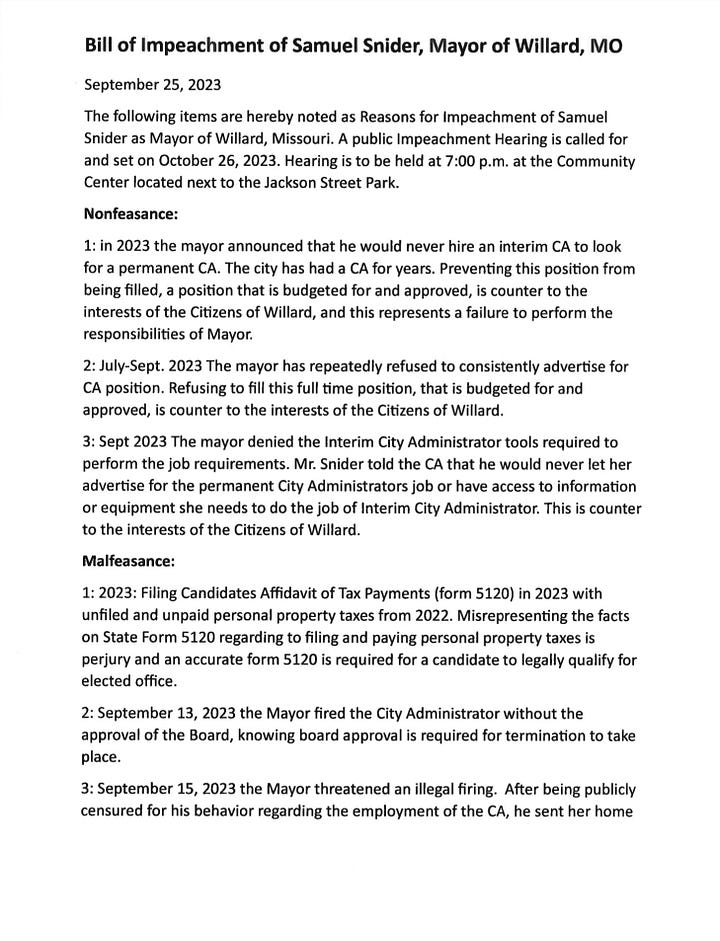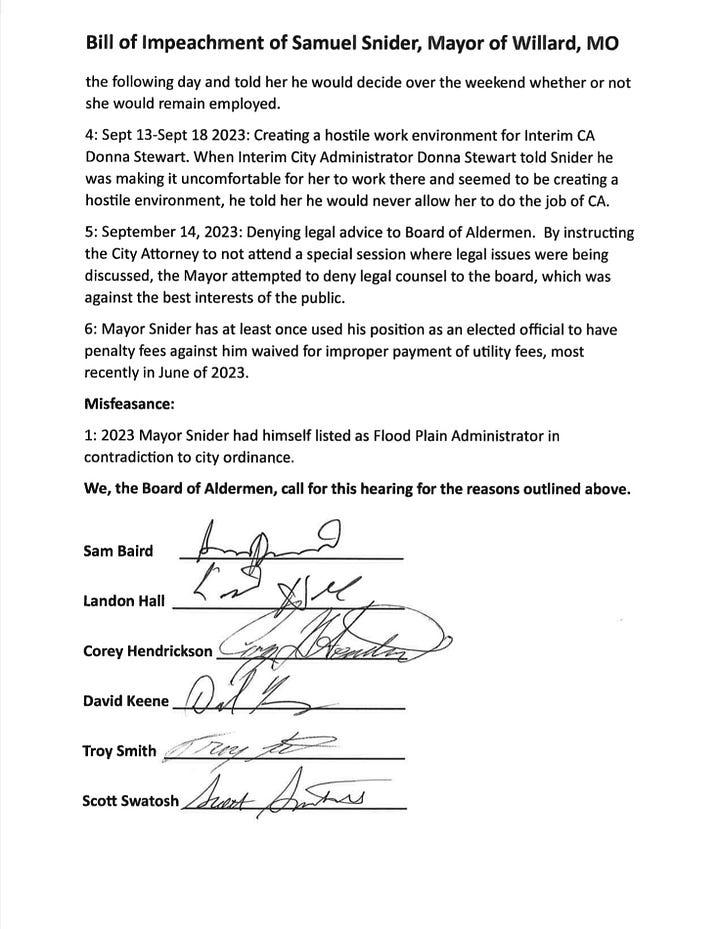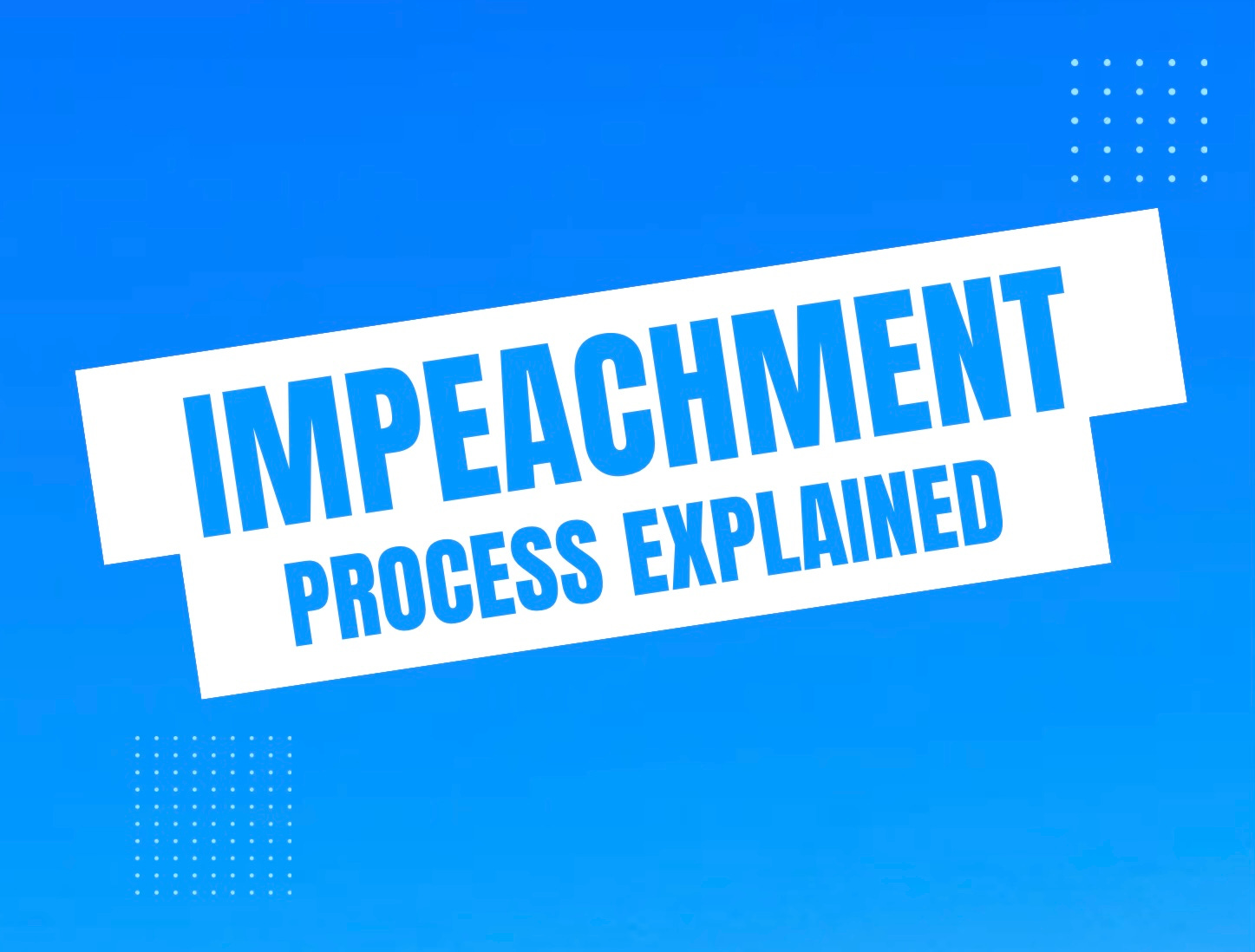Mayoral Impeachment Process Explained
A conviction on a single count is sufficient to impeach Willard mayor — Updated Sunday night to include the Bill of Impeachment
On Friday, I began the process of requesting a copy of the Bill of Impeachment detailing the charges against Mayor Snider. I’ll post a copy or a link to the Bill of Impeachment once available. Updated: Angie Wilson kindly provided the copy below that she obtained through a Sunshine Request.


This article explains acceptable grounds for impeachment, the impeachment process, and the composition of the board of impeachment. It also explains the issue of bias as well as the effects of an impeachment. It does not contain my opinion or an explanation of the ongoing controversy.
The text of this article is borrowed in almost its entirety from “Impeachment: How Not To Get Beat Up On The Process” by Nathan M. Nickolaus, an attorney with Lauber Municipal Law, LLC, with locations in Springfield, Lees Summit, and Jefferson City. Attorney Nickolaus’ article appears to have been published in 2018. Please bear in mind that the information contained herein may not reflect changes to statute or more recent court rulings that have occurred since its publication.
From this point forward, all text appearing outside brackets is quoted directly from Attorney Nickolaus’ article:
One of the most difficult times that any city can experience is [the impeachment of] the mayor, an alderperson or councilperson. This issue is compounded by statutes that provide little guidance as to how this process should take place. Fortunately, or unfortunately, there is a large body of case law explaining how a city should proceed when impeachment is on the horizon.
Authority For Impeachment
For fourth class cities [like Willard], the process of impeachment is set forth in [section 79.240 of the revised Statutes of Missouri]. Although this statute has been placed…under the heading of "Officers" it does in fact also apply to the removal of elected officials.
The board of aldermen may…remove [the mayor] if there is a concurrence of a two-thirds majority [4 of 6 votes] of the board…following a [public] hearing [to be held October 26 at 7 p.m. at the Community Center next to Jackson Street Park].
Grounds For Impeachment
The statute governing impeachment in fourth class cities…require that impeachment can only be "for cause shown.” Recently the Court of Appeals for the Eastern District of Missouri tried to clarify exactly what the term "for cause" means. The Court said:
"the appropriate meaning of the 'for cause standard for impeachment of the elected mayor here should not only 'specifically (relate] to and [affect] the administration of [his] office, and ... be ... of a substantial nature directly affecting the rights and interests of the public,’ it should also be limited to objective reasons which reasonable people, regardless of their political persuasion, could agree would render any mayor's performance ineffective.”
This succinct definition contains a number of very important points. First, the cause must be related to and affect the administration of [a mayor’s] office. Thus, personal conduct would ordinarily not be grounds for impeachment unless it was of such a nature as to affect the person's ability to fulfill the duties of his…office. Where the acts complained of, all took place before [a mayor] took office, there is no basis for impeachment. It is less clear whether acts that occurred during a previous term in office, would be grounds for impeachment in the current term.
Second, the cause must substantially and directly affect the rights and interests of the public. Likely this means that minor offenses that have no impact on the public would not be sufficient to support an impeachment.
Third, the reason must be objective and not based on a person's political perspective. It would not be enough to say someone was a bad mayor or was not doing a good job. Rather, the reason must be such that any objective person would believe that the commitment of such an offense makes any person holding that office ineffective.
Of course, while this definition gives some criteria, it does not identify specific acts that would constitute cause for impeachment. There are a number of examples of grounds over the years that may help clarify what the courts view as sufficient grounds. In Fitzgerald v. City of Maryland Heights, the court said that "acts of misfeasance, the improper performance of some act that may lawfully be done; malfeasance, the commission of some act wholly beyond actor's authority; and nonfeasance, the failure to perform a required duty" would all be sufficient grounds. A fair [though far from complete] list of prior grounds used can be found in the case of Mason v. City of Breckinridge Hills.
[In Mason the Court of Appeals cites several prior cases as examples of what constitutes sufficient grounds, including one where a mayor ordered the name of a city treasurer removed from a bank signatory card and substituted a court clerk without approval, acted discriminatorily by refusing to recognize several board members and prevented them from introducing resolutions during meetings, and interfered with the internal operations of the city police department, along with other actions.]
Commencement Of Impeachment And Pre-Hearing Procedures
[…T]he process is initiated by the filing of a "writing" requesting affirmative relief (in this case impeachment) and the reasons (charges) for which impeachment is sought. In this case, such a writing is often called a Bill of Impeachment or Articles of Impeachment. The reasons need not be set out with the technical precision of a criminal indictment, but must fairly appraise the accused of what he…is charged with.
The complaint should be served on the accused by mail. Personal service is permissible as well; however, it should not substitute for mailed service since that is what [is required]. The accused can file an answer, although an answer is not required.
The notice should indicate when the hearing will take place. Generally, the APA [Administrative Procedures Act] requires 10 days notice of the hearing, but that time can be shortened if it is in the public interest. The courts have specifically found that expediting an impeachment hearing is in the public interest.
Prior to the actual hearing, the ability of either side to conduct traditional discovery is limited.
The APA allows parties to use only depositions, subpoenas of witnesses, and subpoenas duces tecum (a subpoena for documents). Since [Missouri statutes] allow cities to adopt procedural rules for impeachment hearings it is possible for the city to grant more expansive discovery (such as interrogatories and requests for admission). [Unfortunately, the City of Willard has not adopted procedural rules for impeachment other than what is already provide in Missouri statute.] However, it may be impractical to try to adopt such procedures once impeachment has been commenced. Both the applicable statutes and the APA provide for the ability of both sides to call witnesses at the trial. Unlike criminal trials, the accused may be called as a witness under the APA rules.
The Board Of Impeachment
The [October 26th] impeachment hearing [will be] conducted by the…board of aldermen…sitting as a board of impeachment. […M]ayor pro tem [Sam Baird] would be the presiding officer…[unless] the city has engaged a separate attorney to serve as a hearing officer. This is wise, since the board of impeachment may be faced with many evidentiary questions and technical procedural issues.
The accused may not block the hearing by use of a Writ of Prohibition from the circuit court.
Considering the volatility of impeachment, it is likely that the issue of bias by the [board] members will arise. The [mayor] is entitled to a hearing before a board that is impartial and "free of bias, hostility and prejudgment. If [board] members are biased they should be disqualified and not sit on the board of impeachment. Failure to disqualify biased [board] members can be grounds for overturning the impeachment. In reviewing an impeachment case, a court will presume that the members of the board of impeachment are honest and acting with integrity. Past conflict between the accused and board members, even borderline hostility, is not sufficient to prove bias. The fact that the council both initiates the charges and conducts the hearing is not evidence of bias. Rather, to show bias the accused must prove that the council member in question was incapable of fairly weighing the evidence. The accused is entitled to inquire as to bias at the beginning of the proceeding.
Obviously, excluding council members from sitting on the board of impeachment creates a problem; there may be too few council members left to render a decision. For example, if a city [like Willard] is impeaching its mayor and has [six] alderpersons, but [three] are disqualified, the board of impeachment could never reach the two-thirds majority ([four] votes) necessary to impeach. In those instances where the only forum authorized by statute would be unable to proceed, the Rule of Necessity could be invoked to permit a decision to be made by the [board of impeachment] in spite of its possible bias or self-interest.
However, while the Rule of Necessity allows the board of impeachment to proceed despite the bias of some members, it does not apply if those members can be disqualified and a vote can still occur, even if it would require a unanimous decision of the remaining [four] members.
[…W]hen the mayor is being impeached, a two-thirds majority is required. In both cases, the required majority [four votes] is calculated based on all of the members elected to the council [there are six], not just those participating on the board of impeachment.
Often the bill of impeachment will contain multiple counts. It is not necessary that the [mayor] be convicted on every count. A conviction on a single count is sufficient to displace the [mayor] from his…office. The decision of the board of impeachment must be in writing and must contain findings of fact and conclusions of law.
Effects Of Impeachment
If the board votes for impeachment, the [mayor will be] removed from office. At that point, the [mayor] may be said to have been impeached. The office becomes vacant, even if an appeal is filed.
[The News-Leader claims Mayor pro tem Sam Baird would become acting mayor until the April 2024 election, but I’m fairly certain city ordinance 115.070 supersedes or modifies Missouri statute, in which case the nomination “of a successor may be made by any member of the Board of Aldermen and selected with the consent of a majority of the members” and would serve until the next election.]
The [mayor] cannot be appointed to the vacant office or be elected to that office during the same term. He…may be elected back into office at the next term unless precluded by some other provision. [Mayor Snider was elected in April of 2023, so I’m uncertain as to when he would be able to run again for election, whether in April 2024 or April 2025.]
If the [mayor] is impeached, but the impeachment is overturned by the courts, the [mayor] returns to office, unless his or her term has already expired. In that case, the [mayor] has no relief that can be granted.
The [mayor] may appeal the impeachment to the circuit court. The court will presume the correctness of the decision by [the board of aldermen] sitting as a board of impeachment and uphold that decision if it is supported by competent and substantial evidence that [the court will] view in the light most favorable to the [board’s] determination, disregarding all contrary evidence. In addition to considering any procedural defects in the process, the circuit court must find that there was competent and substantial evidence of the "good cause" upon which the impeachment was based.
If the board does not vote for impeachment, the [mayor] remains in office. If the court reverses the impeachment, the [mayor] would be entitled to reimbursement of any pay missed while out of office. The [mayor] is not entitled to have his…attorney's fees reimbursed.
For more about Nathan M. Nickolaus, Esq., please see here.


